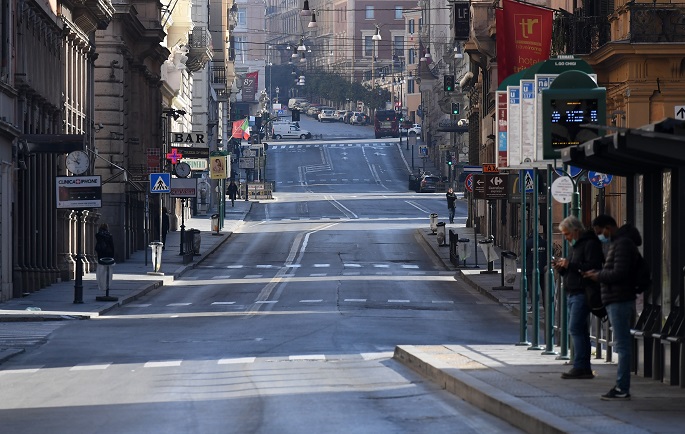European nations reinforce measures to curb virus
Published : 19 Mar 2020, 00:27
With more lockdowns and aid packages, European governments are reinforcing measures to contain the spread of coronavirus, while also seeking ways to mitigate its impact on economy.
Following Italy, Spain and France, Belgium on Wednesday became the latest European countries to introduce a lockdown, asking citizens to stay at home -- except for travels deemed essential, like going to pharmacies, banks and supermarkets -- from Wednesday noon to April 5.
"BIGGEST CHALLENGE"
The World Health Organization (WHO) said Wednesday that more than 200,000 cases of COVID-19 have been reported globally, and 80 percent of these cases were reported in two regions -- the Western Pacific region and the European region.
In Italy, the hardest-hit European country, the cumulative COVID-19 cases and deaths have reached 35,713 and 2,978 respectively, according to latest data released by the Civil Protection Department.
In Germany, the federal disease control agency Robert Koch Institute (RKI) said the number of COVID-19 cases has risen to 8,198 with 12 casualties as of Wednesday. The agency also warned of a scenario of 10 million coronavirus infections in the country in a few months if people did not stay at home.
"If we do not manage to reduce contacts between people effectively and sustainably over a period of several weeks, it is possible that we will have up to ten million infected people in Germany in two to three months," said RKI president Lothar Wieler, adding that such a scenario would result in a corresponding "considerable overload" of the healthcare system.
Calling the coronavirus the nation's biggest challenge since World War II, German Chancellor Angela Merkel urged solidarity among citizens in a speech.
"The coronavirus is now changing life in our country dramatically. Our idea of normalcy, of public life, of social interaction -- all of this is being tested like never before," Merkel said in a video speech broadcast nationwide.
"So let me say this: it's serious. Take it seriously too," she said, noting that "There has been no such challenge to our country since German Reunification -- no, since World War II -- where common solidarity is so important."
In neighboring France, which has entered a two-week lockdown since Tuesday, 9,134 cases and 264 deaths have been reported as of Wednesday, according to authorities.
AID PACKAGES
he International Labor Organization (ILO) said Wednesday that between 5.3 million and 24.7 million jobs will be lost as a result of the economic and labor crisis caused by the COVID-19 pandemic.
In Spain, which has been in a 15-day partial lockdown, Prime Minister Pedro Sanchez admitted that the economy would suffer because of the coronavirus while addressing a special session in the Congress of Deputies,
"The year 2020 will not have 12 months, but rather 10 or even nine," he commented, adding that "GDP will fall." However, he was optimistic that the economy would be able to bounce back from any virus-caused recession.
"If we manage to maintain employment levels, the recovery will be fast," he said, explaining that the measures announced on Tuesday formed part of a "social pact."
The government on Tuesday announced that it will inject 200 billion euros into the national economy in a series of measures to offset the effects of the pandemic.
In neighboring Portugal, the government on Wednesday announced a set of credit lines worth of 3 billion euros to support the sectors most affected by the pandemic, such as catering, tourism and industry.
The Greek government also on the day announced a second package of economic measures. The measures, worth 3.8 billion euros, includes further support for the healthcare sector and the suspension for four months of tax and social security payment obligations for businesses and employees affected by shutdowns, according to Finance Minister Christos Staikouras.
Also on Wednesday, Austrian Chancellor Sebastian Kurz announced a 38 billion-euro aid program, which came on the heels of a 4 billion-euro emergency aid package declared on the weekend.
Elsewhere, the Danish government announced two new economic initiatives, aimed at helping small business owners and businesses in areas seriously hit by the pandemic.


